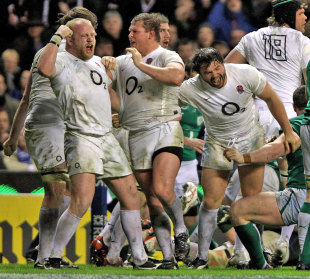|
Comment
Scrum farce must end
John Taylor
April 4, 2012

England celebrate a penalty try against Ireland in a game dominated by the scrum
© Getty Images
Enlarge
The official data from the Six Nations Championship proves beyond all reasonable doubt that, as I was arguing a couple of months ago, we do indeed have a crisis relating to the scrum. The response to my previous plea in this column - 'Save our Scrum' - at the end of December was heartening. It obviously struck a chord with quite a few senior coaches, referees and even those in charge of referees, but now we have facts to show just how deep and serious the malaise really is. According to The Daily Telegraph, in this year's Six Nations, half the scrums ended in collapses (in case I am accused of hyperbole it was actually 49%) and 39 of every 100 scrums ended with the referee awarding a penalty - absolutely crazy and damning. Back in 2005, fewer than a quarter of scrums ended in collapses and only 15% of them ended in penalties. Yet this whole protocol - 'Crouch, Touch, Pause, Engage' - was introduced to make the scrum safer. Serious injuries to front-row forwards in the scrum are not that common, despite the hysteria that led to this ill-fated initiative, but when they do happen it is invariable because the scrum has collapsed. CTPE (it doesn't even make a decent acronym) should be banned on those grounds alone. There are other statistics that are equally alarming for those of us who believe that the scrum is one of the corner-stones of rugby union. Coaches have no confidence in the way scrums are being refereed, so they are learning how to marginalise them. Wales only won clean possession 14 times from scrums in the whole Championship (less than 3 times a game) but won a Grand Slam. The Welsh set pieces have often been a weakness over the years but this season it was different. With Gethin Jenkins, Matthew Rees and Adam Jones, the British & Irish Lions' first choice front-row in 2009, all fit and firing, Warren Gatland should have had an extra weapon but he simply could not afford to base his game on scrum supremacy because that does not guarantee you will not fall foul of the referee. I would hate to go back to the days when games were little more than a series of scrums and line-outs but now it has gone too far the other way. The way the English forwards destroyed Ireland (it was so decisive that Nigel Owens had to go with the flow) was magnificent and the reaction from players and spectators said it all - scrummaging is as popular as ever. Not if it produces the sort of shambles we saw in the Ireland-Scotland game. On that occasion, the scrum consumed more than a quarter of the game.
There are things that could be done immediately. For example - the law says a scrum must be reset if it collapses before the ball is out, but it is crazy to invoke that rule if it is in the back-row and available for the scrum-half. Northern hemisphere officials tend to be pedantic about this while their southern hemisphere counterparts generally allow play to continue. For once, I'm with the southerners. That law is all about safety but the damage, if there is any, has already been done in that case and with the number of collapses these days you are only increasing the risk by insisting on a reset. In the longer term, the whole philosophy of refereeing needs revisiting and the International Rugby Board (IRB) slid out a press release the weekend after the Six Nations announcing a 'Referee Selection Restructure.' The thing that caught the eye was that Wayne Barnes and Dave Pearson, the two Englishmen on the elite international panel, had been dropped from the list of those who will referee tour matches and the Tri-Nations this summer. Hidden away near the end was the announcement that Paddy O'Brien, the IRB Referees Manager, had decided to 'step down after seven years of excellent service.' "He has decided he requires a fresh challenge," it continued, before revealing he will be concentrating on Sevens - who do they think they are fooling? We do not know who will replace him - according to the statement, "the process for replacing O'Brien will be announced in due course". It's a sure sign there was no long term plan but, hopefully, it will be somebody who is prepared to look at law changes from a different perspective, particularly relating to the scrum. O'Brien did a good job in many ways but his scrum legacy is a complete mess. The dreaded CTPE has to go and this is a chance to go back to basics. We could even see the ball being put in straight and hookers who have to hook. Otherwise change the law - it's a complete farce at the moment. © ESPN Sports Media Ltd. John Taylor is a former Wales and British & Irish Lions international and currently the managing director of London Welsh
| |||||||||||||||
Live Sports
Communication error please reload the page.
-
Football
-
Cricket
-
Rugby
-
- Days
- Hrs
- Mins
- Secs
F1 - Abu Dhabi GP
Abu Dhabi Grand Prix December 11-131. Max Verstappen ()
2. Valtteri Bottas (Mercedes)
3. Lewis Hamilton (Mercedes)
4. Alexander Albon ()
5. Lando Norris ()
6. Carlos Sainz Jr ()
-
ESPNOtherLive >>
Darts - Premier League
Golf - Houston Open
Snooker - China Open
Tennis - Miami Open

